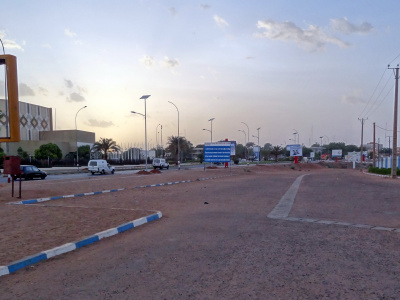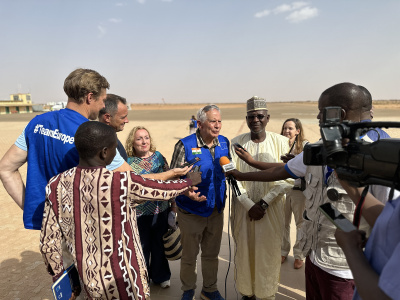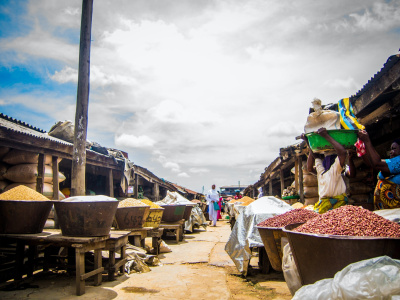
Niger’s coup: Who loses from ECOWAS sanctions?
Authors
Niger’s recent military coup is one among at least six in the Sahel region in recent years. Much of the international commentary so far has focused on what these coups mean for democracy in Africa, anti-French sentiment and Russian propaganda in the region, security and the false dichotomy with democracy, or the prospects of the Economic Community of West African States (ECOWAS) as a regional governance actor.
Less has been said about economic aspects such as regional trade, which play an important role in shaping interests of neighbouring countries, ultimately impacting regional responses to the ‘democracy’ crisis in Niger and across the so-called coup belt in the Sahel.
Disrupted regional supplies and markets
In response to the military coup in Niger, ECOWAS and the West African Economic and Monetary Union (WAEMU, or UEMOA in French) introduced rigorous sanctions. Land and air borders between ECOWAS countries and Niger were closed and a no-fly zone on all commercial flights to and from Niger (now partially lifted) was imposed. All commercial and financial transactions between member states and Niger were suspended, halting trade including electricity supply, and government assets held in the UEMOA Central Bank were frozen, as were assets of Niger state enterprises and parastatals held in commercial banks. Similar sanctions were also introduced after the coups in Mali, Burkina Faso and Guinea, barring them from trading with neighbours.
Landlocked countries like Niger, Mali and Burkina Faso rely on their (coastal) neighbours to trade with the rest of the world. This already makes trade expensive for them. They also typically import more than they export, including food to sustain fast-growing populations. Given Niger’s high levels of dependence on food imports, prices have soared since the sanctions kicked in, and there are growing reports of shortages. Suspension of Nigerian power, accounting for 70% of Niger’s consumption, interrupted electricity supply, contributing to further disruptions for smaller businesses, unable to bear the higher costs of running generators, and food spoilage.
Landlocked countries also depend more on regional trade than coastal countries. Much of Niger’s imports and exports are within the region.
Landlocked countries also depend more on regional trade than coastal countries. Much of Niger’s imports and exports, as the graphs below show, are within the region. This stands in stark contrast with Ghana or Nigeria for instance, which trade with African countries outside the immediate ECOWAS region, including South Africa and Morocco. These estimates do not take into account the large-scale informal cross-border trade, largely in food, which in West Africa represents up to 30% of regional trade. Though often overlooked, this is an important system that sustains rural and urban societies, but which is severely disrupted by economic sanctions.
Niger is among the largest exporters of onions, with extensive trade networks spread across the wider ECOWAS region and beyond. Other agricultural exports include livestock and related products, cowpeas and gum arabic.
Although ECOWAS heads of state were unanimous in the need for a regional response to the coup, the willingness and ability to maintain such sanctions may be determined by how the economic fallout of the sanctions can be managed, especially with regards to the close trade relations with neighbouring countries. This is also observed elsewhere – the EU’s own struggle to maintain sanctions against Russia illustrate this difficulty. Ultimately, in ECOWAS, the socio-economic realities and the need of neighbours to continue trading may undo the sanctions, or at least their effect, rather than forcing the military leaders to concede.
Neighbours don’t like losing business
Sanctions have a negative impact not only on Niger but also its neighbours. News reports cite how ECOWAS sanctions have hit border towns in Nigeria. As truckloads of agricultural produce are stuck at the border, prices in destination markets also shoot up, as seen in Ghana, which imports up to $2 million worth of onions from Niger each week.
Niger’s trade with countries outside the region passes through the port of Cotonou in neighbouring Benin. As an entrepôt state, Benin depends on transit trade in the region, both formal and informal. It is the main gateway for Niger; in fact, 70 to 80% of trade volumes passing through the port of Cotonou are destined for Niger.
Beyond the immediate impact of economic sanctions – in terms of blocked traders and over 6,000 truck drivers – there are therefore also multiple additional knock-on effects on Benin’s economy and port, and trade and transport actors in and around Cotonou. Though less dependent, a similar risk faces Togo, for whom Niger is a key transit and export market.
Nigeria instead depends on Niger’s imports of electricity. Having obstructed upstream development in the Niger river basin, Nigeria’s sale of electricity to Niger, Benin, Burkina Faso and Togo is an important source of forex generation, amounting to $51 million in 2022. With ECOWAS sanctions against Niger, Nigeria is losing potential export revenues.
Sanctions are also affecting people’s livelihoods beyond trade. The movement of seasonal workers, to and from Niger, has become severely limited, affecting businesses.
Sanctions are also affecting people’s livelihoods beyond trade. The movement of seasonal workers, to and from Niger, has become severely limited, affecting businesses. While informal cross-border movement continues, this is not enough to offset the losses due to stalled transit trade and migratory flows.
Sanctions clearly affect various groups of people – even if they are not meant to be the target. Neighbouring governments will likely be pressured to address these issues and avoid collateral damage. In Mali, sanctions were said to risk amplifying the effect on food insecurity. They also resulted in protests in neighbouring countries. The loss in transit trade for Senegalese operators made their government resistant to imposing ECOWAS sanctions on Mali. There are already initial signs of this happening in Benin, with the opposition interrogating the government on these sanctions.
What will decide the future of Niger and ECOWAS, democracy or trade?
All this raises questions not just about the role of ECOWAS as a regional governance actor, but also the ability of regional bodies to apply agreed norms (and in this case, sanctions) in the face of economic and potentially political domestic repercussions. While member states are keen to signal their opposition to unconstitutional changes of government, socio-economic considerations nonetheless shape what is practically feasible and eventually their ability to stand in unity.
In ECOWAS, as in other intergovernmental bodies, it is the heads of state who drive the agenda – as Nigerian president Bola Tinubu's hard response shows as he holds the ECOWAS presidency. In itself, ECOWAS is really a reflection of its members’ interests.
While the ‘ECOWAS-11’ want to emphasise their rejection of coups by enforcing sanctions, trade partners nevertheless are keen to maintain ties with Niger.
While the ‘ECOWAS-11’ want to emphasise their rejection of coups by enforcing sanctions, trade partners nevertheless are keen to maintain ties with Niger. Even among the more vocal supporters of action against Niger, like president Tinubu, Nigerian political groups, civil society and business interests could undermine this hard line. Others, less directly concerned by the ‘coup contagion’, may also lose their resolve, as seen in the case of Ghana.
Niger’s neighbours are primarily military juntas who, suspended from ECOWAS decision-making, reject implementing any sanctions. Solidarity with Niger can tighten trade relations among them. This would undermine the principle of regional sanctions.
Unanswered questions
Beyond ECOWAS, there is uncertainty regarding Niger’s status on other regional and continental agendas. Niger was among the first countries to ratify the African Continental Free Trade Area (AfCFTA) agreement, with former president Issoufou Mahamadou widely lauded as an AfCFTA champion. But it’s not clear whether Niger’s suspension from the AU also includes the AfCFTA, or whether land trade with Algeria, Libya and Chad might continue.
As we show elsewhere, these neighbouring countries are seeking peaceful solutions to avoid further instability in the region. As was observed in Mali, could Niger explore opportunities to use other existing transport corridors (the Trans-Saharan Road Corridor), or establish a new one with countries not imposing sanctions (Guinea), as it seeks a way out from the economic sanctions?
Finally, there are questions around how external partners and countries in the region led by military regimes can engage with Niger. Trade disruptions risk undoing previous efforts to improve the efficiency of priority corridors in West Africa (such as the Trade Facilitation West Africa Program, TFWA), all of which link coastal countries to landlocked Niger, Mali and Burkina Faso.
Under its latest multi-annual budget, the EU moved from funding regional bodies directly to supporting regional programmes at the country and multi-country level. While intended to be more pragmatic and flexible to navigate challenges around lack of financial resources, capacity or coordination mechanisms in regional bodies, the current situation also raises challenges. How to support regional economic integration from the country level when political regimes are overturned?
The recent ‘coup contagion’ clearly raises concerns around governance and democracy. But at a practical level, citizens seek development and livelihoods which depend on interactions with neighbours to earn incomes. While the sanctions may seek to arm-twist detractors into respecting democracy to serve their populations, the wider socio-economic realities may themselves push the region to a more pragmatic path. Achieving an 'ECOWAS of peoples: peace and prosperity for all' would therefore mean striking a balance between these forces to ensure visible dividends of good governance while facilitating socio-economic recovery. At the end of the day, one cannot eat democracy.
The views are those of the authors and not necessarily those of ECDPM.










